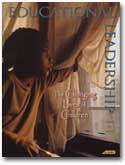Parent Involvement and Perfect Attendance
So Hawkins tells parents: "If you want us to save your child, you'll come in here and support us, or your child will be transferred." The parents want the children at the academy, because students are not suspended from this school. Attendance is almost perfect, and parents volunteer in the classroom, in Saturday School, in the Life Skills Lab. In the lab, for example, students learn how to dress for success—and more:We have a survival kit with clean underwear, clean socks, deodorant, toothpaste, and toothbrush. The kids just use the kits; when we see they're empty, we just buy more. They can take whatever is in the kit; we don't care. We're trying to teach them how to care for themselves. If kids come to school dirty, we clean them up. If kids are hungry, we feed them—three meals a day. I always say to them, "You can be as smart as Einstein, but if you don't know how to brush your teeth, comb your hair, and put on a clean outfit, you're going nowhere. No one will hire you."
Not only does Hawkins bring parents into the classroom; she has also been known to take the class to the parents—anything to get kids to school (and at 99.2 percent, the Academy has the highest attendance record in the district):The first time a group of children is absent without an excuse, I take the whole class to the neighborhood and pick the absent children up. We walk up the street, go to the children's houses, and I say, "Oh, I realize that you don't want to be absent. It must be that you're scared to walk through the neighborhood—so you get a bodyguard. We have come to get you."So all the neighbors watch us coming to get the kids, and the kids are embarrassed. These children tell the other students, "Next time, you can't be absent, because Momma is going to come get you." Yes, indeed, I intimidate them to come to school. Momma means business.
School Means Business
The philosophy of the Recovering the Gifted Child Academy is that every child has gifts. And it is the teacher's job to help children develop those gifts. One way to do this, according to Hawkins, is to view school as the children's business. This is not just a metaphor. Business permeates the school community—from the way the children dress (dress pants or skirts, blazers, dress shoes), to the corporations the students run, to the paychecks they get and the savings accounts they maintain. Hawkins explains how it works:The kids clock in every morning at eight, and they clock out every day at five. They get paid $10 a day in "school money" for attendance. If they stay after school to work on their individual educational program, they get paid time-and-a-half. They can get paid only if they've figured out how much they have earned. So, if you work time-and-a-half for three hours, I ask you, "How much are you supposed to get paid?"Now, if you don't know what it is, you don't get paid. Maybe I'll offer $30, and you say, "That's not right." Then I say, "Well, you have to tell me how much you should get. You're always supposed to know how to figure your own paycheck." The kids can exchange their earnings at the school store for snacks, books, clothing, and other items.
In addition to earning school money, the students earn real money through their corporations at the real-life mini-mall they run. Set up in a converted classroom, the mall has many shops—and even real customers from outside the school. Hawkins states:We teach kids how to put in stock, how to mark it up or down, how to record profits or losses. The kids pay rent for their stores, they pay electricity, they pay somebody to clean up, and they pay an accountant and an auditor. They even pay the person who decorates the mall. We created all kinds of jobs that it takes to run a shopping mall, and everybody gets paid out of a percentage of the kids' (real) money.Once a month our mall is sponsored by a corporation, whose employees are invited in to shop. That's where the kids get their cash—and 30 percent of that has to go into their savings accounts.
In the mini-mall, students learn entrepreneurial skills, along with reading, math, civics, economics, art, and other subjects. Hawkins says that she is the wholesaler, but the kids do everything else:The younger children are the distributors, and the older students are the retailers. So before the mall is open, the retailers have to go to market (in a hallway), where the 5th graders sell them all the things they've made for the retailers to resell at the mall. And that's how the 5th graders make their money. That's their business. And then the children in the other grades run the mall. We teach the kids how to restock, which relates to reading and math. They have to tell me when they are making money or losing it as businesspeople.
Saturday School and Self-Esteem
Important to the academy's success is what goes on outside of school hours. Not only do staff members and their families provide sanctuary for children in their homes—Momma says, "I had 12 children at my house one recent weekend"—but the whole community participates in Saturday School. Business volunteers, parents, teachers, and students catch up on assignments, work in one-to-one tutoring pairs, participate in life-skills training, and enjoy Geography Club or choir:Saturday School is for children who didn't get all their assignments completed because they weren't focused—for whatever reason. A lot of corporate volunteers come on Saturday, which is really powerful. Heller Financial, Inc., one of our big corporate sponsors, sends its staff for one-on-one tutoring to help the kids overcome their fear of performance in the classroom.Parents who work during the week and haven't completed their required volunteer time teach kids survival cooking in our kitchen. Other parents teach kids sewing, quilting, and laundry skills. We tell the kids: "Bring in all your dirty clothes, and we'll teach you how to wash and iron them on Saturday."
Ten Secrets to Kids' Self-Esteem
Always think about how to bring out the best in your child.
Praise your children's achievements and efforts.
Create an aura of compassion in your home.
Listen more than you talk with your children.
Give your kids hugs and love every day.
Create warm memories around learning experiences to motivate your children.
Make sure your children know that you will be there for them when they need you.
Don't worry that offering too much affection to children is "overprotective."
Read to children every day, and let them read to you.
Don't be afraid to teach family and moral values, so that your children can become role models for tomorrow.
Another activity that continues after school, on Saturday, and on field trips is what Hawkins calls "pregnancy prevention":In this 9-week course, students walk around with an egg all day, without breaking it. They go through the entire life cycle of an unborn baby—every week represents a month of the baby's life. The kids have to figure out a budget for food, child care, diapers, and other expenses. They call hospitals and find out how much it costs to have a baby in the hospital without public aid. They create scenarios for life skills, for example, for a married couple, including where they work and how much they make an hour and whether they earn enough to care for a child.Students have to visit a clinic. They visit museums where they might take their children, and they visit bookstores and buy books they would read to them. And at the end of the course, we show them a real-life video of a woman having a baby.The first thing the kids say (after their shocked reaction to the video, that is) goes something like this: "I can't afford to have a baby. It costs too much to have a baby for real—when they cut public aid, I wouldn't be able to buy diapers." In the six years of this program, only two teens got pregnant before they finished high school.
Successes and Challenges
Momma's Continuing Education
One way Momma Hawk prevents her own burnout is by going back to school herself—and bringing her homework into the academy. I made one of the greatest sacrifices in my life when I returned to school, to take an accelerated administrative program at Roosevelt University in Chicago. I have learned about special education laws and important educational research from professors who have gone through what we are trying to do. In the past, I just went at this from my heart. Now I'm learning how to do it from the law. I haven't been too far off base, but now I can come back to school and implement what I have learned with a tremendous burst of energy.
Perhaps the greatest benefit of Hawkins's graduate school experience is the example she is setting for lifelong learning. Hawkins says that she has to leave school early two days a week to attend classes, and her students cheer her on and help her: I tell the children, "You see, I'm asking for excellence out of you, and I miss school to get excellence for myself." I involve my students in helping me do my class projects. I say, "Momma's in school, and I need you to help me.”Before I leave for class, they'll say, "Momma, you got your homework done? Is everything ready? Don't be late, Momma, you know that's not excellence. You have to leave now." When it's time for my grades, they want me to put them up on the wall next to theirs. It is just so precious because it helps them to see that you're never too old to learn, and that you need to continue to go forward in life.





